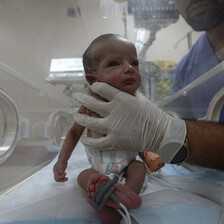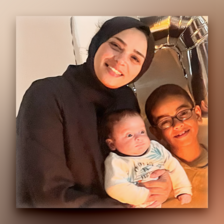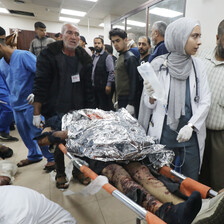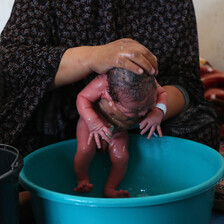The Electronic Intifada 10 July 2024
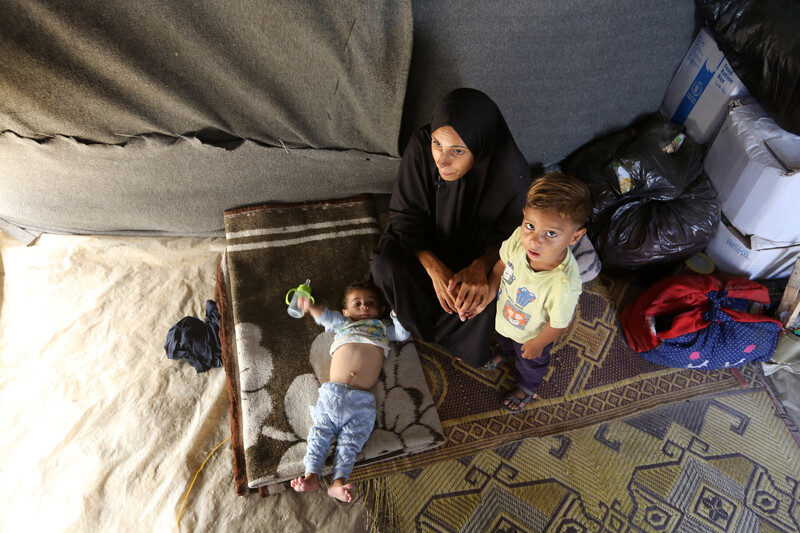
There is no respite for mothers in Gaza. Noura Abu Al-Saud sits in a tent inside a camp to accommodate displaced people in Deir Al-Balah in the central Gaza Strip, on 30 June 2024. She is a mother of 3 children, one of which suffers from malnutrition.
APA imagesDuring my research on postpartum depression, I shared a study questionnaire in late May on my medical Instagram page, asking whether any of my followers who had given birth in the six weeks prior would participate.
I received a response from a woman called Hiba.
“And what about someone whose due date is approaching? My mental state is zero, I’m devastated, very scared and my family is not with me, they are still in northern Gaza. What should I do?”
I tried to reassure her and replied that she shouldn’t worry, that I would be there for her during her delivery and that the International Medical Corps (IMC) field hospital, which had relocated to the Mawasi area of Rafah in April, where I understood Hiba had sought shelter, was still operational.
“I have left Rafah after the barracks — where I had taken refuge — were bombed,” Hiba replied, however.
She added that the Emirati hospital was out of service, and she feared giving birth under such risky conditions.
Hiba left Rafah for al-Bureij camp in the central Gaza Strip, believing it to be safer and that she would deliver her baby under better circumstances there.
She had also asked me when her ninth month of pregnancy would start, telling me her last period was on the ominous 7 October 2023.
On 4 June this year, while Hiba, eight months pregnant, was asleep along with her two daughters, son and husband, an airstrike hit the house in which they had taken refuge. Hiba’s husband and one of her daughters were killed. She and her other children were injured.
Premature labor
Hiba went into premature labor as a result of the bombing, underscoring the validity of studies that link stress and fear to triggering labor pains and early delivery.
Due to her injuries, she was taken to Al-Aqsa Martyrs Hospital, which doesn’t offer maternity services, prompting an obstetrician to be summoned from another hospital.
When I managed to visit Hiba, she shared her harrowing experience:
“Roba, can you imagine? I gave birth without even seeing my baby or knowing what was happening around me. It was a normal vaginal birth, not a C-section. It feels like a miracle.”
Hiba gave birth under the worst conditions.
Burns around her eyes had left her unable to open them or see for several days.
She gave birth on the day her husband was martyred; neither he nor any other family member was by her side.
She was also right when she said she feared not finding a hospital in Rafah to give birth in. The IMC’s field hospital was forced to relocate again in early June, this time to Deir al-Balah in the central Gaza Strip.
Her newborn son, Mahmoud, named after Hiba’s husband, will always carry with him the sorrow of the day of his birth.
Common cruelty
Hiba’s tragedy is one constantly repeated in Gaza. During my work at the IMC field hospital, I often witnessed heartbreaking scenes of a mother giving birth to a child whose father had been killed.
Despite its frequency, I never grew accustomed to the cruelty. The tearful words I overheard mothers speak to their newborns often repeat in my mind:
“I wish your father was here to see how beautiful you are.”
“Oh God, my son, you were born without a father in this cruel world.”
“I wish your father had taken us with him so we wouldn’t have to endure all this suffering, my little one.”
I can’t begin to imagine the devastation Hiba must have felt upon waking from general anesthesia to discover that her fingers had been amputated and that her husband and daughter were gone.
The juxtaposition of bringing new life into the world while losing a loved one creates an emotional paradox.
Joy and grief intersect, leading to complex emotional responses. This duality can result in severe psychological trauma as the mind struggles to reconcile these opposing experiences.
There is no safe place in Gaza. Pregnant women face danger from military violence, unsanitary conditions and insecure shelters during pregnancy, during delivery and afterward.
The long-term effects of experiencing such profound trauma can vary. Some individuals may eventually find ways to integrate their grief and move forward. Others might struggle for years.
The impact on the child should also be considered, as the mother’s ability to bond and care for the child can be affected by her psychological state.
Dr. Roba Almadhoun is an obstetrician in Gaza.
